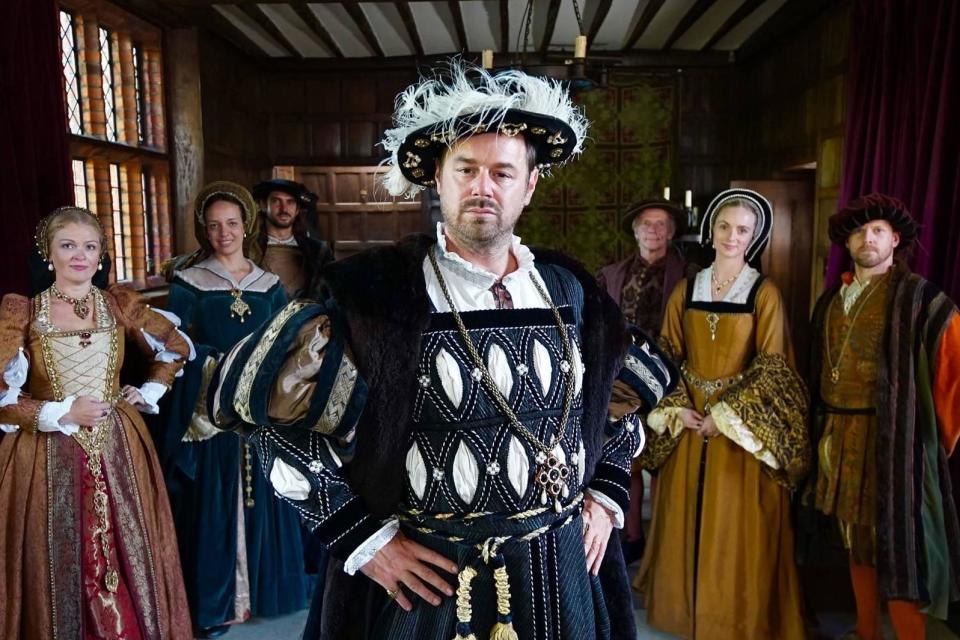Danny Dyer’s Right Royal Family review: The saintly presenter is one of Britain’s finest ambassadors
We know Danny Dyer as many things: professional cockney (though not mockney – he was born in Canning Town); Mick Carter, landlord of the Queen Vic in EastEnders; protege of Harold Pinter (true); father of 2018 Love Island winner Dani Dyer; and, thanks to the BBC’s Who Do You Think You Are?, direct descendant of King Edward III (reigned 1327 to 1377).
As you must know by now, Edward is Danny’s 22-times granddad, the discovery of which gave rise to Danny’s emotional reaction: “This is stupid, innit? I need to get my nut around it. And then I’m gonna treat myself to a massive ruff.”
He and the BBC have also treated us to no less than two hour-long instalments profiling some of Danny’s illustrious ancestors. Or, in the Dyer vernacular, “we’re gonna get right stuck in, gorging on my ancestral lives ... we’re gonna get regaled out of our brains”.
The first programme is devoted to the earliest four centuries of the Dyer genetic inheritance, and a mixed bag of geezers they are too. The furthest back they can trace Danny’s family tree is to Rollo, born around 860. He was king of the Vikings, or “varkins’” as Dyer would have it – the people who “used to wear them hats”. Rollo, as you’d expect (and much like Danny himself) relished a “right old tear-up” and, thus, a group of convincing Swedish re-enactors help Danny to assume the mantle, if not the accent, of the Norse leader, strutting down a coastline, their shields overlapping to frustrate imaginary Anglo-Saxon spears, Danny giving voice to the ancient war cry “Do you want some? Do yah?”
Rollo, in fact, also gave the people of Paris and the French king “some”, with the result that he and his mates were granted the right to settle in a new land for the Norseman, hence Normandy. Rollo and his descendants became dukes of Normandy, and one, William, was the Dyer antecedent who conquered England; 1066 and all that. So it was that the Dyer DNA arrived in the British Isles, and a small reminder that even the most quintessentially English hero – Prince Danny of Walford – is descended from immigrants crossing the Channel in an inadequate water craft.
Impressive as these right royal geezers were, they were as nothing to the sheer wealth and extent of Henry II’s domains. As Danny, dressed in princely robes, observes from the top of Henry’s “beautiful gaff”, Dover Castle, Henry basically owned everything from the Scottish border to the Pyrenees, partly due to his marriage to Eleanor of Aquitaine (“bit of a looker” as well as loaded). Henry was an illustrious monarch, and not just because he was the 22-times granddad of someone who called David Cameron a “twat” on television. Yet Henry will always be remembered for being responsible for the assassination of his close adviser Thomas Becket, when he infamously but rhetorically asked, “who will rid me of this turbulent priest”. For the consequences of this piece of “rabbiting”, in Dyer terms, Henry would always suffer remorse. Danny just wants to know “where’s me crahn?”
The best is left to last. For Danny is also related to an actual saint – King Louis IX of France (1214-1270). Unlike Rollo, William and Henry, Louis was not inclined to a bit of a rumble, and was pious to the point of self-flagellation, given to wearing the supposed crown of thorns that was once placed on the head of Christ. Danny doesn’t have a go at reprising that, but he does wander around the streets of Paris barefoot, his “trotters off”, in a linen tunic, chanting his prayers. He then heads to the magnificent royal cathedral of Sainte-Chapelle, created by Louis in the expectation that when Christ returned to regain his crown of thorns, it would be ready for him in this exquisite vaulted temple. Danny goes there before the second coming of the son of God, as it goes, and is suitably awed by the surroundings, experiencing something of a divine moment, sort of like when he made friends with Ian Beale.
For his efforts in the name of God and the church, Louis IX was made a saint posthumously by Pope Boniface VIII in 1297, whereas Danny will have to make do, for now, with his 2014 nomination for “sexiest male” in the British Soap Awards, presented by Phillip Schofield, and two National Television Awards for Most Popular Serial Drama Performance.
I suppose, at this point, it’s a bit unkind, but essential, to point out that, given England’s tiny population in the 14th century, and the laws of mathematics, anyone with European ancestry in England today has about a 99 per cent chance of being descended from Edward III. Indeed, therefore, if you are part of this large cohort, you also have a similar chance of being related to Danny Dyer himself. You also have a 100 per cent chance of being related to Harold Shipman, Theresa May, the bloke in the chippy, and even the idiot bastard you have the grave misfortune of having to work for. You see, saint or sinner, prince or pauper, we are all part of one race, the brotherhood of man. And the saintly and regal Danny Dyer stands as its finest ambassador.

 Yahoo News
Yahoo News 

